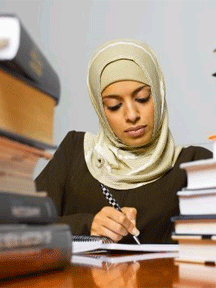By Austin Alexander
In a recent article in The New York Times, “Muslims from Abroad Are Thriving at Catholic Colleges,” Richard Pérez-Peña brings to light a new and interesting trend in American Catholic universities. Increasingly, students from the Muslim world intent on earning degrees in the United States are opting to attend faith-based institutions steeped in Christian values rather than secular schools. As a representative of the University of Dayton in Ohio reported to Pérez-Peña, that school’s Muslim population has increased more than six-fold in the last decade and features a much higher proportion of women.
To be sure, the decisions of Muslim students, particularly women, to attend Catholic colleges are in part guided by practical considerations. Indeed, many hail from societies that place a markedly lower premium on partying and permissiveness than our own, and the relatively conservative social atmosphere on these campuses helps to soften the culture shock. Features such as all-female dorms and community service requirements can make followers of Islam feel more at home.
But Muslim students feel welcome at these colleges for reasons other than the institutions’ emphasis on traditionalism. The general aura of religiosity on campus helps to create an environment in which faith, in all its forms, is respected and nurtured. As one Kuwaiti student at the University of Dayton said, “Here people are more religious, even if they’re not Muslim, and I am comfortable with that,” Pérez-Peña reported. At Creighton University in Omaha, classes designed to promote interfaith understanding appear on the curriculum, and at Dayton the administration provides Muslim students with an ablution and prayer room, offers them dining alternatives and facilitates the celebration of religious holidays. In sum, these schools are much more than static “safe spaces” for religious beliefs and practices – they actively work to create an eclectic community of believers.
In an opinion piece for the Chronicle of Higher Education, Eboo Patel, whose own father was an Indian-born Muslim who attended Notre Dame, expands on the findings of Pérez-Peña’s piece. As he sees it, there is a valuable lesson to be gleaned from the positive experiences of Muslim students at Catholic colleges that can be applied to any type of university.
Religion, to be sure, is often considered a source of divisiveness in public discourses, and religious communities are among the most insular social groups. Because faith is so personal and deep-seated, even the open discussion of such topics can be labeled as taboo. But in the unique environment of a college campus – even one with strong religious leanings – these popular assumptions have little ground to stand on. Because universities function as “miniature civil societies” – essentially, as playgrounds for social capital and the free exchange of ideas – they have the uncanny ability to corral people of disparate backgrounds into a common forum. Therefore, college campuses are more or less primed to serve as bastions for this budding trend of interfaith cooperation.
If only, Patel laments, religion was as prominent in the public discourse as race, sexual orientation, and other topics. It is essentially an untapped medium for intercultural exchange, and its potential as such should be exploited, especially in the tolerant, give-and-take setting of a college campus. As Patel advises, the United States, after all, is not only the “most religiously diverse nation in human history,” but one marked by a “constant undercurrent of religious prejudice,” directed notably toward Islam. It is only natural that American colleges and universities should form the vanguard of the effort to counter this phenomenon. Only in such institutions, founded on the values of empirical understanding and ethical reflection, can interfaith exchanges lay the groundwork for a more diverse (and thoughtful) nation.
Austin Alexander is a senior at Clark University majoring in history. Clark University is home to the Lambda of Massachusetts chapter of Phi Beta Kappa.




